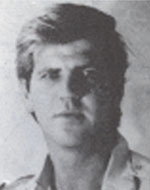Mitzafon, Raphael
Rafael, son of Henia and Daniel, was born on February 4, 1946. He completed his elementary studies in Avihail and later moved to the Michmoret Marine School, where he completed two years of study, He was a talented boy and a good student who worked on his studies, and since he always loved the sea, he was successful in his studies in the seamanship, and was a member of a family of underground fighters before the establishment of the State of Israel. Rafael was drafted into the IDF in mid-November 1963 and assigned to the infantry. After basic training he underwent various courses and became a paratrooper fighter. Then he went to an officers’ course and at the end he joined a paratroopers brigade. During the Six-Day War, he took part in the battles in the Golan Heights and was already a deputy commander, and after that he was assigned the command of snipers, He was an art lover and during his spare time he painted and sculpted, and he was very fond of diving and underwater swimming, and in Eilat he served as the commander of a Nahal company that alternately held positions in the maintenance of the canal line and various functions At the mother base in Eilat. When he finished his job holding the line and all of his men returned whole and healthy, he was not proud and pleased with him. In the middle of 1969, during the War of Attrition, Rafi was hit in the head by a bullet while he was in a machine gun battle with Egyptian soldiers and was taken to a hospital. When he recovered from his wounds he asked to be transferred to the Armored Corps. After completing various courses, he became commander of a tank company. All his service was spent on the southern front. In the meantime, he had two daughters, and when he was quiet in the front lines, he decided to finish his career in the IDF and build his future outside the army, and his first son was born in August 1973. He was an exemplary father and husband who cared for his family and was Simcha when the Yom Kippur War broke out. He participated in the fighting until October 14, the day he was injured and transferred to the Beilinson Hospital, and immediately after he got to his feet he began to wander around the hospital looking for his friends among the wounded, and when he found soldiers from his battalion the joy was great. For saving their lives during the fighting, and he made sure that the nurses fulfilled all their requests and did not miss them After a while he demanded that the doctors release him so that he could return to the front, and when they refused, he escaped from the hospital, returned to Sinai, and joined an armored brigade as battalion commander. On the 21st of Tishrei 5734 (October 21, 1973) while he was fighting in the area of the “Chinese Farm” his tank was hit and he abandoned. The Egyptians advanced toward him and Rafi feared that he would be taken prisoner. He decided to try to reach our forces, and during his retreat he was hit and killed. For a long time he was absent, and when his body was found, he was brought to eternal rest in the cemetery in Sheikh Abrik. He left behind a wife, two daughters and a son, parents, three brothers and two sisters. After his death, he was awarded the rank of Major. In a letter of condolence to the bereaved family, his commander wrote: “Rafi participated in the battle to establish the bridgehead in the central sector of the Suez Canal, and his actions and perseverance in this long war served us as a source of inspiration for our forces. The suffering of our country for security and peace. “
